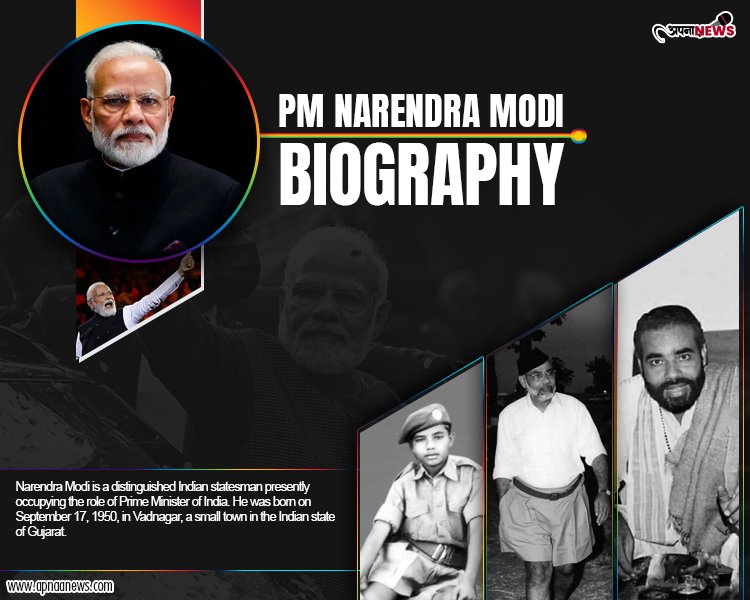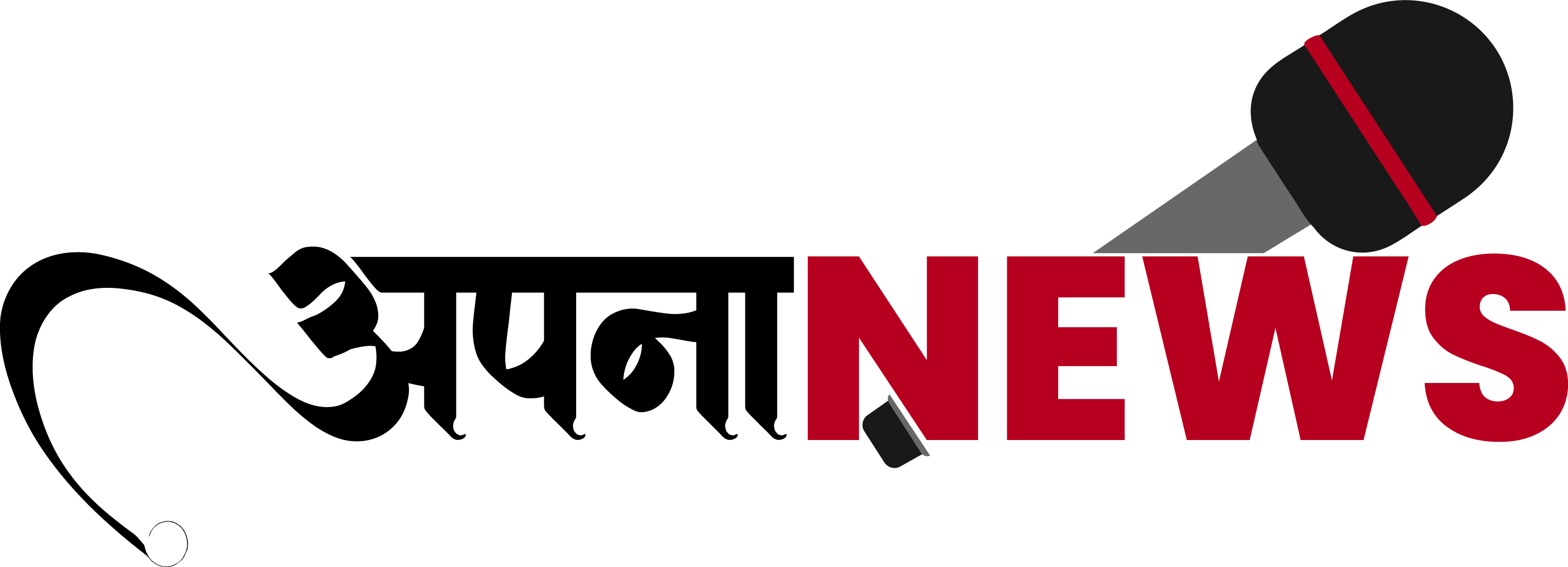Prime Minister Narendra Modi Biography - Get all details here
Discover the inspiring story of Prime Minister Narendra Modi! Learn about his life, journey, and achievements. Get all the facts here

Narendra Modi is a distinguished Indian statesman presently occupying the role of Prime Minister of India. He was born on September 17, 1950, in Vadnagar, a small town in the Indian state of Gujarat.
In the year 1987, Modi aligned himself with the Bharatiya Janata Party (BJP), subsequently emerging as a prominent figure in the "Namo" (Narendra Modi) campaign of 2001, which aimed at securing his position as the Chief Minister of Gujarat. Serving in this capacity for a span of 13 years, Modi orchestrated a series of multifaceted economic and sociopolitical reforms, fostering investment and spearheading employment initiatives within the state.
His leadership culminated in a momentous victory for the BJP in the 2014 Lok Sabha (lower house of parliament) elections, propelling him to the esteemed position of the 14th Prime Minister of India.
As the head of the government, Modi has orchestrated a plethora of economic and social initiatives. The "Make in India" campaign, designed to invigorate Indian manufacturing, the Swachh Bharat Abhiyan, a nationwide drive to cultivate cleanliness, and the Ayushman Bharat Yojana, aimed at extending healthcare services to the underprivileged, stand as notable examples.
Moreover, he has championed pivotal projects like the Smart Cities Mission, Kayakalp, and the Atal Mission for Rejuvenation and Urban Transformation, all of which strive to effect fundamental enhancements in the country's infrastructural landscape.
Early Life and Political Beginnings:
-
Joined Rashtriya Swayamsevak Sangh (RSS) at age eight.
-
Became a full-time pracharak (campaigner) for RSS.
-
Developed organizational and leadership skills within RSS.
Prime Minister Narendra Modi Political Life
-
Here is the whole political life spain of Prime Minister Narender Modi
In the year 1960:
During his formative years, Prime Minister Modi actively assisted his father in vending tea at the Vadnagar Railway Station. Subsequently, he embarked on establishing a tea stall adjacent to the bus stand in collaboration with his brother.
In the year 1967:
Prime Minister Modi accomplished his secondary education in Vadnagar. Owing to familial exigencies, he embarked on a period of extensive travel across Northern and North-Eastern India spanning approximately two years.
In the year 1975:
Narendra Modi assumed the mantle of General Secretary for the Gujarat Lok Sangharsh Samiti under the aegis of the Rashtriya Swayamsevak Sangh (RSS). In response to the Emergency, he embraced clandestineness to evade apprehension, owing to his involvement in the distribution of pamphlets opposing the government.
In the year 1978:
Prime Minister Modi assumed the role of a pracharak (campaigner) for the Rashtriya Swayamsevak Sangh (RSS) in the Surat and Vadodara regions, actively participating in a spectrum of RSS activities.
In the year 1979:
During 1979, Narendra Modi committed himself as a full-time worker to the Rashtriya Swayamsevak Sangh (RSS). He engaged fervently in RSS activities within the precincts of Surat and Vadodara. In subsequent progression, he relocated to Delhi, embarking on research and documentation pertaining to the historical context of the Emergency.
In the year 1985:
The Rashtriya Swayamsevak Sangh (RSS), acknowledging Narendra Modi's contributions, deployed him to the ranks of the Bharatiya Janata Party (BJP). In the year 1987, Modi orchestrated and steered the BJP's campaign during the Ahmedabad Municipal Corporation elections, yielding a noteworthy triumph.
In the year 1986:
Following in the footsteps of Lal Krishna Advani, Narendra Modi ascended to the position of National Secretary within the BJP, constituting a remarkable accomplishment. Concurrently, the RSS undertook strategic placements of its members with pivotal roles within the BJP.
In the year 1990:
In 1990, Narendra Modi ardently supported the "Ram Rath Yatra" led by Lal Krishna Advani, and in 1991, he lent his endorsement to Murli Manohar Joshi's "Ekta Yatra."
In the year 1995:
Modi's elevation continued as he assumed the mantle of National General Secretary for the BJP, prompting his relocation to New Delhi. His pivotal role extended to orchestrating significant election campaigns for the BJP in the states of Haryana and Himachal Pradesh.
In the year 2001:
In 2001, due to the health-related incapacitation of Keshubhai Patel, the BJP entrusted Narendra Modi with the role of Chief Minister of Gujarat. He took the oath of office on October 7, 2001. He subsequently secured victory in a by-election within the Rajkot-II constituency on February 24, 2002.
In the year 2002:
Emerging triumphant, Modi secured a resounding victory in the Maninagar constituency during the elections of 2002, warranting his reinstatement as the Chief Minister of Gujarat for a second term.
In the year 2007:
Commencing on December 23, 2007, Narendra Modi commenced his third term as the Chief Minister of Gujarat.
In the year 2012:
Narendra Modi secured victory once again from the Maninagar constituency, clinching an emphatic triumph over Shweta Bhatt. Subsequently, he assumed office for his fourth term as the Chief Minister, relinquishing the post in 2014.
In the year 2014:
Narendra Modi emerged triumphant in the 2014 elections to become the 14th and present Prime Minister of India, officially taking office on May 26, 2014.
In the year 2019:
On May 23, 2019, Narendra Modi secured his re-election as the Member of Parliament from Varanasi, reaffirming the trust and confidence of the Indian populace. His victory over the Congress candidate Ajay Rai ensued. This resounding endorsement paved the way for his second term as India's Prime Minister. On May 30, Modi once again assumed the mantle of the Prime Ministerial office, reaffirming his commitment to the nation.
Interesting Facts about Narendra Modi
Narendra Modi, bearing the complete name of Narendra Damodardas Modi, was born on September 17, 1950, in Vadnagar, Gujarat, India. Initiated into public service at a young age, he became associated with the Rashtriya Swayamsevak Sangh (RSS) at the tender age of eight, subsequently evolving into a dedicated full-time pracharak (campaigner).
In his formative years, Modi actively contributed to his family's business by assisting his father in vending tea at Vadnagar Railway Station. As he matured, he ventured into entrepreneurship by establishing a tea stall near the local bus stand, a collaborative effort with his brother.
Key Initiatives and Policies of Narendra Modi
-
"Make in India" campaign to boost the manufacturing sector.
-
Swachh Bharat Abhiyan (Clean India Campaign) for cleanliness and sanitation.
-
Implementation of Goods and Services Tax (GST) for tax reform.
-
Digital India initiative for technology-driven governance.
-
Foreign policy advancements and global engagement.
Achievement of Prime Minister Narendra Modi
Under Prime Minister Narendra Modi's leadership, India has witnessed significant achievements through various initiatives:
-
Digital India: Launched to ensure digital access for all citizens, Digital India encompasses projects like e-governance services, a national fiber network, and a digital document locker.
-
Make in India: This campaign promotes domestic manufacturing, attracting foreign investment and generating employment opportunities.
-
Swachh Bharat Abhiyan: A national cleanliness drive, it has led to widespread sanitation awareness, construction of toilets, and cleaner public spaces.
-
Jan Dhan Yojana: Aimed at financial inclusion, it has opened over 43 crore bank accounts for Indian citizens.
-
Ayushman Bharat: Providing health coverage, this program offers free insurance for vulnerable populations, ensuring medical access and financial security.
-
Atmanirbhar Bharat: Focusing on self-reliance, it fosters domestic industries, innovation, and entrepreneurship, reducing dependence on imports.
-
Neighborhood First Policy: Strengthening regional ties, it enhances trade, development partnerships, and cultural exchanges with neighboring countries.
PM Modi's initiatives span various sectors, including agriculture, education, and infrastructure, driving India's development and improving citizens' lives.
Conclusion
Prime Minister Narendra Modi's visionary leadership has ushered in a new era of development and progress for India. Through his innovative initiatives, ranging from digital empowerment and manufacturing growth to healthcare access and regional partnerships, he has positively impacted the lives of millions.






